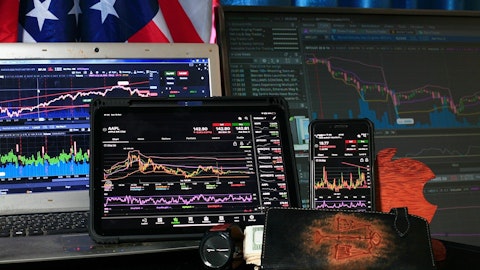In this article, we discuss 10 consumer stocks that analysts are bearish on as recession begins. If you want to see more stocks on this list, check out Analysts are Bearish on These 5 Consumer Stocks as Recession Begins.
The first half of 2022 was pretty turbulent, owing to high inflation, consequent interest rate hikes by the Fed, the crypto crash, and the Russian war on Ukraine. The only safe havens seem to be the US dollar and crude oil, as the stock market has mostly been in the red since the beginning of the year. At market close on July 1, the Dow Jones Industrial Average was at 31,097.26, and a recent CNBC survey suggests that 77% of company CFOs expect the benchmark index to fall below 30,000.
While demand for consumer staples remains robust even amid recessionary environments, consumer discretionary stocks take a notable hit as consumers and households realign their budgets to prioritize needs over wants. Luxury products, alcohol and tobacco, branded consumer goods, automobiles, and even elective medical supplements/procedures take a backseat when unemployment and tight budgets are pressuring the economy.
In this macro environment, analysts are bearish select consumer discretionary names before recession sets in. Some of the most notable consumer stocks that recently received negative ratings from market experts include Altria Group, Inc. (NYSE:MO), Tesla, Inc. (NASDAQ:TSLA), and Walgreens Boots Alliance, Inc. (NASDAQ:WBA).

withGod/Shutterstock.com
Our Methodology
The consumer stocks selected for this list have recently received bearish ratings from prominent investment advisories. We have mentioned the hedge fund sentiment around the holdings as of Q1 2022.
Analysts are Bearish on These Consumer Stocks as Recession Begins
10. Unilever PLC (NYSE:UL)
Number of Hedge Fund Holders: 23
Unilever PLC (NYSE:UL) is a London-based multinational consumer goods company. The stock has declined about 16% year to date as of July 5. Societe Generale analyst David Hayes on May 16 double downgraded Unilever PLC (NYSE:UL) to Sell from Buy and slashed the price target to 3,400 GBp from 4,300 GBp, citing the “same concerns that have plagued our enthusiasm for much of the past three years”. While the analyst had previously upgraded Unilever PLC (NYSE:UL) to Buy after he noticed a step-up in the company’s acknowledgement of the need to significantly shift its portfolio and market exposure, the analyst now contended that Unilever PLC (NYSE:UL)’s hands “have now been tied” and the risk of a marked slowdown in sales and “ever decreasing” margins is back.
According to Insider Monkey’s database, 23 hedge funds reported bullish positions in Unilever PLC (NYSE:UL) at the conclusion of the first quarter of 2022, with combined stakes worth $1.10 billion. Tom Russo’s Gardner Russo & Gardner is the biggest shareholder of the company, with 7.8 million shares worth $356.6 million.
In addition to Altria Group, Inc. (NYSE:MO), Tesla, Inc. (NASDAQ:TSLA), and Walgreens Boots Alliance, Inc. (NASDAQ:WBA), Unilever PLC (NYSE:UL) is one of the consumer stocks that recently received a bearish rating from analysts.
Here is what Fundsmith Equity Fund has to say about Unilever PLC (NYSE:UL) in its Q4 2021 investor letter:
“Unilever seems to be laboring under the weight of a management which is obsessed with publicly displaying sustainability credentials at the expense of focusing on the fundamentals of the business. The most obvious manifestation of this is the public spat it has become embroiled in over the refusal to supply Ben & Jerry’s ice cream in the West Bank. However, we think there are far more ludicrous examples which illustrate the problem. A company which feels it has to define the purpose of Hellmann’s mayonnaise has in our view clearly lost the plot. The Hellmann’s brand has existed since 1913 so we would guess that by now consumers have figured out its purpose (spoiler alert — salads and sandwiches). Although Unilever had by far the worst performance of our consumer staples stocks during the pandemic, we continue to hold the shares because we think that its strong brands and distribution will triumph in the end.”
9. Diageo plc (NYSE:DEO)
Number of Hedge Fund Holders: 21
Diageo plc (NYSE:DEO) is a British multinational beverage alcohol company that sells whiskey, vodka, rum, liqueur, tequila, cider, gin, beer, and hard seltzer under multiple brands. The stock has declined about 23.32% year to date as of July 5. As a recessionary environment sets in, people are likely to spend money on necessities and cut down on frivolous expenses like partying and alcohol, which does not bode well for companies like Diageo plc (NYSE:DEO).
On June 29, Deutsche Bank analyst Mitch Collett downgraded Diageo plc (NYSE:DEO) to Sell from Hold with a price target of 3,230 GBp, down from 4,050 GBp. The analyst said the stock is “priced for perfection” while Diageo plc (NYSE:DEO) is suffering from decelerated growth. According to the analyst, Diageo plc (NYSE:DEO)’s U.S. spirits growth is cooling off and its inventory levels could “overshoot”, leading to shipments lagging depletions. The analyst also observed softness in consumer spending, which could potentially weigh on Diageo plc (NYSE:DEO)’s results while the stock’s valuation remains “stretched”.
Among the hedge funds tracked by Insider Monkey, 21 funds reported long positions in Diageo plc (NYSE:DEO) at the end of the March quarter, up from 19 funds in the last quarter. Nicolai Tangen’s Ako Capital is the leading stakeholder of the company, with 1.6 million shares worth $341.6 million.
Here is what Lindsell Train has to say about Diageo plc (NYSE:DEO) in its Q4 2021 investor letter:
“A very important aspect of the rationale for investing in this smaller and more rarefied category is the fact that alcohol brands with a premium or luxury positioning tend to be highly differentiated, with a greater ability to increase prices over time than a “value” or mass market brand – even in downturns or periods of turbulence. Over time, these inflation-busting protective qualities usually result in considerable value creation: in January this year, against a backdrop of a sharp increase in input cost prices, Diageo reported increased operating profit margins – crucially, driven by price increases rather than cost savings – and indicated an expectation of operating profit growth of between 6 and 9% to 2025. Such an outlook would not be possible without a portfolio of beverages enjoying substantial pricing power.” (Click here to see the full text)
8. Bed Bath & Beyond Inc. (NASDAQ:BBBY)
Number of Hedge Fund Holders: 15
Bed Bath & Beyond Inc. (NASDAQ:BBBY) is a New Jersey-based retail company that sells bed linens, bath items, kitchen textiles, and home furnishings. On July 1, S&P Global Ratings lowered its issued credit rating on Bed Bath & Beyond (NASDAQ:BBBY) to B- from B+. The negative rating from S&P on the stock reflects the risk of a downward re-rating over the coming 12 months if the company performance does not improve and it is unable to display prospects of a meaningful return to sustainable positive free cash flow.
On June 30, Loop Capital analyst Anthony Chukumba lowered the price target on Bed Bath & Beyond Inc. (NASDAQ:BBBY) to $1 from $5 and maintained a Sell rating on the shares. The analyst noted that the company’s Q1 results were even worse than predicted and with Q2 off to a soft start, deteriorating macroeconomic conditions, and multiple large retailers struggling with surplus home goods inventory, the situation may not improve for Bed Bath & Beyond Inc. (NASDAQ:BBBY) anytime soon.
According to Insider Monkey’s Q1 database, 15 hedge funds were bullish on Bed Bath & Beyond Inc. (NASDAQ:BBBY), down from 17 funds in the earlier quarter. John Overdeck and David Siegel’s Two Sigma Advisors is a prominent shareholder of the company, with 915,474 shares worth $20.6 million.
Here is what L1 Capital Long Short Fund Limited has to say about Bed Bath & Beyond Inc. (NASDAQ:BBBY) in its Q4 2021 investor letter:
“Detailed, bottom-up stock research remains the investment team’s primary focus and the core driver of portfolio performance. 2021 once again demonstrated the team’s ability to identify ‘winners’ through extensive company and industry research across a diverse range of sectors. Bed Bath & Beyond‘s shares surged after showing strong operating momentum in early 2021, along with a large buyback program and a short squeeze. Exited holding in January (around $45), near share price peak.”
7. Walgreens Boots Alliance, Inc. (NASDAQ:WBA)
Number of Hedge Fund Holders: 38
Walgreens Boots Alliance, Inc. (NASDAQ:WBA) is an American pharmacy, health, and beauty retail company. Via its network of retail drugstores, the company sells prescription drugs, as well as health, wellness, beauty, personal care, consumable, and general merchandise products. The stock has declined over 27% YTD as of July 5. In its Q3 financials, the company reported that continuing operations declined approximately 4% YoY to $32.6 billion, which was the first contraction since Q4 2020. Walgreens Boots Alliance, Inc. (NASDAQ:WBA) said that the underperformance occurred as the home delivery pharmacy sales declined post-COVID.
Morgan Stanley analyst Ricky Goldwasser observed that Walgreens Boots Alliance, Inc. (NASDAQ:WBA) management was positive about the company’s mid-single digit growth target for earnings per share, but she finds it “difficult to bridge to targets and consensus” given the tough macro environment. The analyst argued that 2023 consensus estimates as of July 1 “need to come down by more than 11%” and reiterated an Underweight rating and a $43 price target on Walgreens Boots Alliance, Inc. (NASDAQ:WBA) shares on July 1.
Among the hedge funds tracked by Insider Monkey, 38 funds reported long positions in Walgreens Boots Alliance, Inc. (NASDAQ:WBA) at the end of Q1 2022, down from 42 funds in the earlier quarter. Stephen Dubois’ Camber Capital Management is the biggest shareholder of the company, with 2.40 million shares worth $107.4 million.
Here is what Aristotle Capital Management Global Equity has to say about Walgreens Boots Alliance, Inc. (NASDAQ:WBA) in its Q1 2022 investor letter:
“We first invested in Walgreens Boots Alliance in early 2013. Over our holding period, Walgreens merged with U.K.-based Boots Alliance, establishing itself as a global leading retail pharmacy chain. CEO Stefano Pessina set the company on a path of pursuing strategic partnerships (as opposed to vertical integration deals) to increase store traffic and to, over time, transform the business into a neighborhood health destination around a more modern pharmacy. Using its strong FREE cash flow generation, the company ramped up its investments in technology, aiming to accelerate the digitalization of health information. Mr. Pessina was not successful, however, at turning around the firm’s U.S. retail segment and had to deal with increasing prescription drug reimbursement pressures. He stepped down as CEO in 2020, and in 2021, Roz Brewer took the reins of the firm. We admire Ms. Brewer’s impressive track record at companies that include Starbucks (NASDAQ:SBUX) and Walmart (Sam’s Club). However, given management’s decision to divest core cash-generative businesses and redeploy capital to embryonic healthcare startups, we prefer to step aside while we follow the company’s progress.”
6. The Boston Beer Company, Inc. (NYSE:SAM)
Number of Hedge Fund Holders: 22
The Boston Beer Company, Inc. (NYSE:SAM) is a Massachusetts-based company that produces and sells beers, hard ciders, and hard seltzers under multiple brand names. It is one of the consumer stocks that have lost significant value over the last year. YTD share price decline as of July 5 stands at about 41%.
Goldman Sachs analyst Bonnie Herzog on June 28 downgraded The Boston Beer Company, Inc. (NYSE:SAM) to Sell from Neutral, slashing the price target to $318 from $380. The analyst is “incrementally more negative” on The Boston Beer Company, Inc. (NYSE:SAM) given the feedback from beer distributors. She sees an “even greater negative risk/reward” for the company, citing the outlook for the hard seltzer category, which has further worsened and distributors are also lowering their hard seltzer inventory levels. The Boston Beer Company, Inc. (NYSE:SAM) is facing accelerating volume declines and gross margin headwinds also press on, the analyst told investors in a research note.
According to Insider Monkey’s data, 22 hedge funds reported owning stakes in The Boston Beer Company, Inc. (NYSE:SAM) at the conclusion of the first quarter of 2022, down from 32 funds in the earlier quarter. Henry Ellenbogen’s Durable Capital Partners is a prominent shareholder of the company, with 142,550 shares worth $55.3 million.
Like Altria Group, Inc. (NYSE:MO), Tesla, Inc. (NASDAQ:TSLA), and Walgreens Boots Alliance, Inc. (NASDAQ:WBA), The Boston Beer Company, Inc. (NYSE:SAM) is one of the stocks on the radar of market experts amid the recessionary crisis.
Here is what Artisan Mid-Cap Fund has to say about The Boston Beer Company, Inc. (NYSE:SAM) in its Q3 2021 investor letter:
“We ended our campaigns with the Boston Beer Company. Boston Beer Company sells a focused portfolio of alcoholic beverage brands. In recent years, the company has emerged as one of the leaders in the hard seltzer category, which has grown over 150% in each of the past three years (2018-2020). Boston Beer’s Truly brand, the second-largest seller of hard seltzer, has benefited from this growth and was core to our investment thesis. However, the hard seltzer category’s growth has recently slowed to single digits, falling short of high investor expectations and pressuring Boston Beer’s earnings upside. Truly’s growth was core to our investment thesis, and a recovery is uncertain; thus, we ended our investment campaign.”
Click to continue reading and see Analysts are Bearish on These 5 Consumer Stocks as Recession Begins.
Suggested articles:
- 10 Best Gaming Stocks to Buy Now
- Ken Fisher Loves These 10 Defensive Stocks
- The 10 Best Bank Stocks to Buy Amid Rising Inflation
Disclosure: None. Analysts are Bearish on These 10 Consumer Stocks as Recession Begins is originally published on Insider Monkey.





